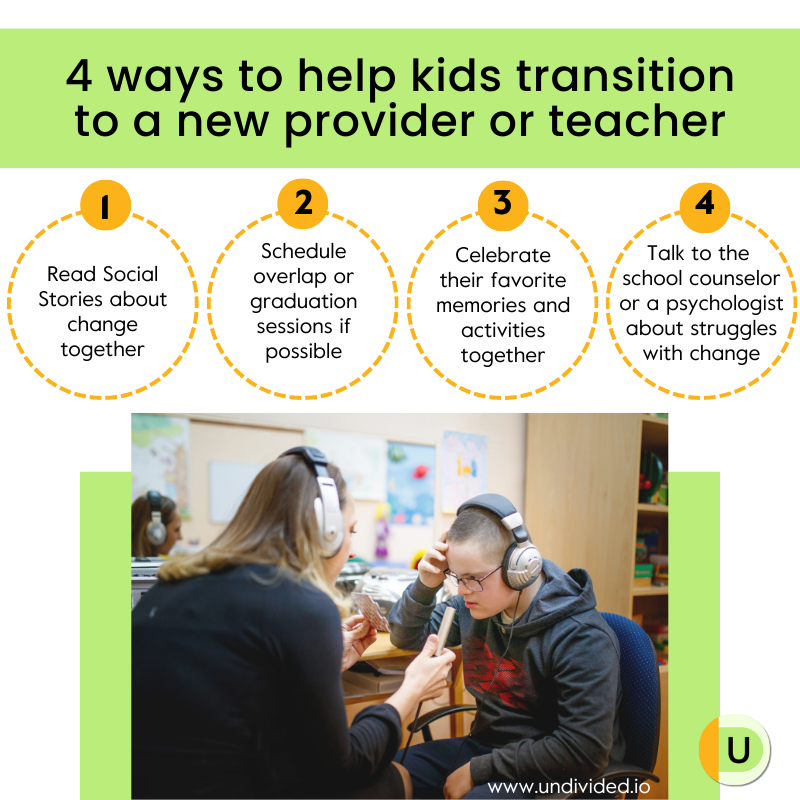Helping Our Kids Cope with a Change in Providers
When a favorite therapist, teacher, school aide, or caregiver is no longer available or moves on, it’s common for kids to feel confusion and anxiety due to the change and the loss of a trusted part of their daily or weekly routine. It may feel challenging to find meaningful ways to support our kids in coping with this loss, so we talked with special education advocate Dr. Sarah Pelangka to find out how we can best validate their feelings, help them understand why people come and go from their lives, and prepare for the new support people they will be working with instead.

Dr. Pelangka tells us that Social Stories, which are narratives that illustrate various situations and how best to handle them, are a helpful option if your child is responsive to them. Social Stories are commonly used to help children understand events taking place in their lives as well as social norms and how to interact with the world around them. Studies indicate that the benefits of using Social Stories include helping children cope with changes and life transitions, understanding their behavior as well as others’, and understanding emotions they may be experiencing — such as anger, sadness, and anxiety — and how to deal with them.
One way to help kids prepare for a provider change is to ask the supervisor or head of the IEP or therapy team to create a personalized Social Story that implements your child’s interests. Reading the Social Story prior to the transition will help familiarize your child with the concept of change and give them the opportunity to express their feelings (verbally or in pictures) about how the story makes them feel. It will also allow the outgoing provider to help your child work through those feelings and to introduce the new provider. Learn about creating your own custom Social Story in our article How to Write a Social Story — With Templates!.
Overlap and graduation sessions
It is ideal for the outgoing service provider or therapist to hold overlap sessions with the incoming provider to help establish a positive working relationship with the child. The incoming provider will then work hands-on with the child while the outgoing therapist observes. It may also be possible to hold a final overlap session with the outgoing support provider and child, which would ideally be play-based (and perhaps in the home environment). Dr. Pelangka tells us that this is unfortunately rare, however, primarily due to funding issues: “Therapists often can’t bill for servicing the same client at the same time under insurance,” she explains.
If the provider doesn’t leave abruptly, Dr. Pelangka says a “graduation session” with the supervisor or therapist is common. In this case, the child can see the provider (either remotely or in person), possibly read the Social Story they created, and have an opportunity to celebrate their time together before saying goodbye.
When the provider change is outside the support team’s control, such as a sudden transfer or loss of a staff member, the support team supervisor — ideally, someone the child is familiar with — should step in to make sure your child is well supported during the transition by conducting the training and observing the new provider.
In a school-based setting, the new provider will often be unfamiliar and, in some cases, temporary until a permanent provider is found. If you want to minimize transitions for your child, you can opt to wait until a permanent replacement is hired and request that the district make up the hours that were lost during the interim. For school-based aides, it is unfortunately all too common for the district to rotate positions or for aides to leave abruptly — however, you can request that overlap training days take place before an aide leaves and their replacement begins. “Schools are able to pay both,” Dr. Pelangka says. And it’s a great way for a new aide to get to know a child while they’re still with the aide with whom they feel comfortable.
Establish kid-friendly rituals
If rituals are important to your child, establishing a ritual to help them cope with their loss may bring comfort. This could include:
- finding photos and making a mini photo album or scrapbook of their time with the provider
- writing and/or drawing pictures of favorite activities they did with the provider
- finding an activity, such as playing a certain game or going to a particular place that the child and provider enjoyed and repeating it with the child
Dr. Pelangka recommends contacting the school counselor or primary physician if your child is having a hard time with the loss of their support provider. It may also be beneficial to reach out to an appropriate child psychologist or therapist.
Join for free
Save your favorite resources and access a custom Roadmap.
Get StartedAuthor



Social Stories about change